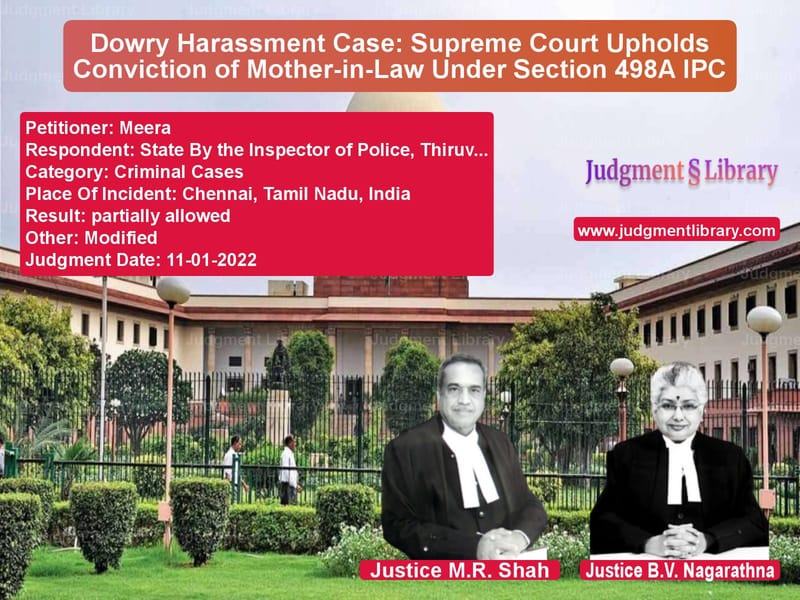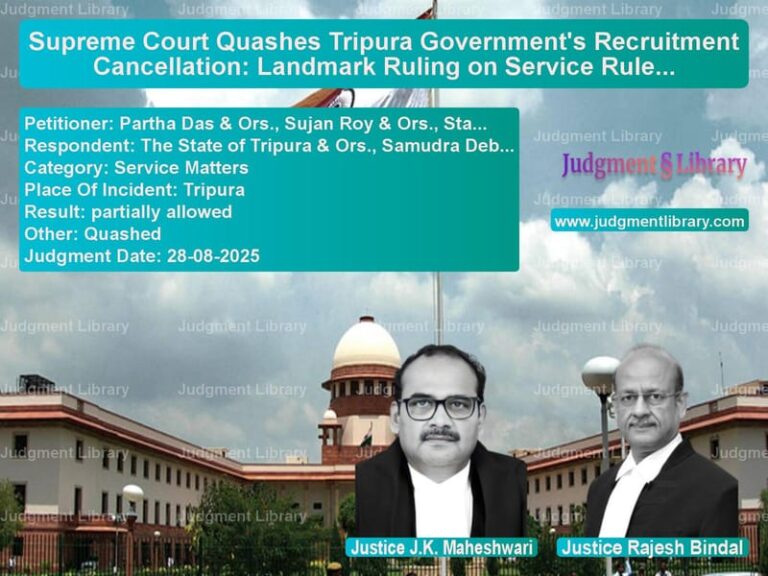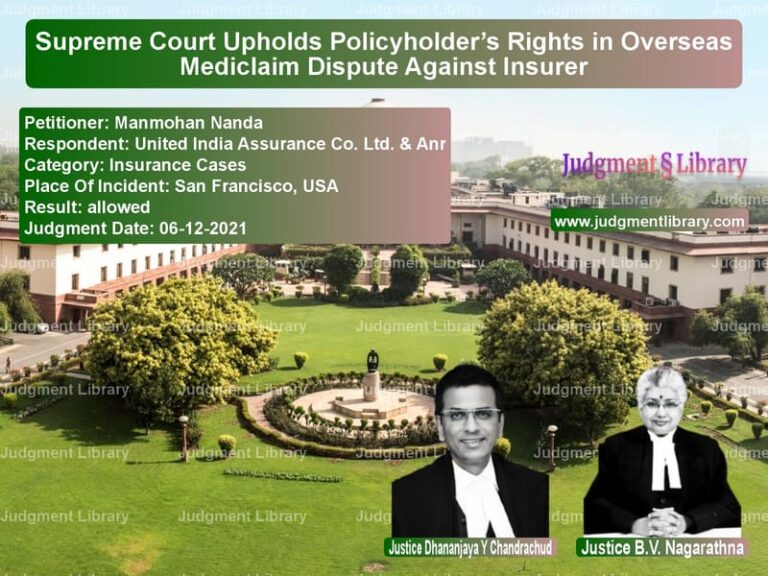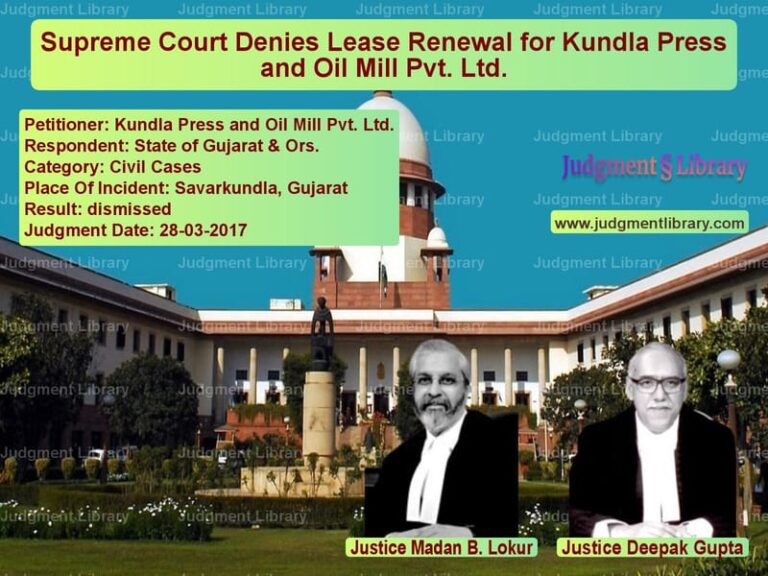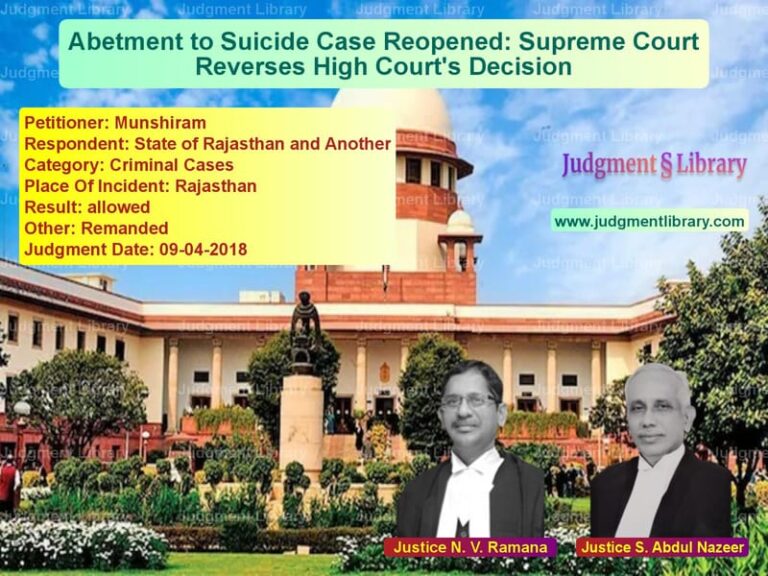Dowry Harassment Case: Supreme Court Upholds Conviction of Mother-in-Law Under Section 498A IPC
The case of Meera v. State By the Inspector of Police, Thiruvotriyur Police Station, Chennai revolves around allegations of dowry harassment and cruelty under Section 498A of the Indian Penal Code (IPC). The Supreme Court examined whether the mother-in-law of the deceased was rightfully convicted based on the evidence presented.
Background of the Case
The case originated from a complaint filed by PW-1, Ramathilagam, the mother of the deceased, alleging that the accused—including the victim’s husband, mother-in-law, sister-in-law, and father-in-law—subjected her daughter to continuous harassment for dowry. As a result of this cruelty, the deceased set herself on fire and later succumbed to her injuries.
The police registered a case under Sections 498A and 306 IPC. The charge sheet was filed against four accused. The trial court, after examining 16 witnesses and relevant documentary evidence, convicted three of the accused, including the husband, mother-in-law (A2), and sister-in-law (A3). The trial court sentenced them to:
Read also: https://judgmentlibrary.com/supreme-court-mandates-nationwide-vulnerable-witness-deposition-centres/
- One year of rigorous imprisonment (RI) under Section 498A IPC along with a fine of ₹1,000.
- Three years of RI under Section 306 IPC along with a fine of ₹2,000.
High Court Proceedings
On appeal, the Madras High Court acquitted all accused of the charges under Section 306 IPC (abetment of suicide). However, the conviction under Section 498A IPC was upheld for the mother-in-law (A2), while the husband and sister-in-law were acquitted.
Arguments of the Appellant (Mother-in-Law, Meera)
- The appellant argued that both the trial court and the High Court erred in convicting her under Section 498A IPC.
- She claimed that the deceased was not in a condition to give a statement, as she had suffered 96% burns.
- The High Court disbelieved the evidence of prosecution witnesses (PW-1 to PW-3) for acquitting the husband and sister-in-law, and the same logic should have applied to her case.
- The alleged quarrels in the household were domestic in nature and did not constitute cruelty under Section 498A IPC.
- In the alternative, the appellant, who was 80 years old, requested leniency in sentencing.
Arguments of the Respondent (State of Tamil Nadu)
- The prosecution argued that the mother-in-law played an active role in harassing the deceased for dowry.
- PW-1 (mother of the deceased) and PW-2 (father of the deceased) consistently testified that the victim was harassed for not wearing enough jewelry.
- The deceased was left alone with her in-laws, as her husband frequently traveled abroad.
- There was sufficient evidence to prove that the appellant continuously harassed the deceased, leading to severe mental distress.
Key Observations of the Supreme Court
1. Role of the Mother-in-Law in Harassment
The Court upheld the concurrent findings of the trial court and High Court that the deceased was subjected to cruelty:
“It has been established and proved that the deceased was subjected to torture and cruelty by the mother-in-law with regard to jewelry.”
2. Reliability of Witness Testimonies
The Court emphasized that the testimonies of PW-1 and PW-2 (parents of the deceased) remained unshaken despite cross-examination:
“Both witnesses stood by their statements, and there is no reason to disbelieve their account of the harassment.”
3. Protection of Vulnerable Women
The Court noted that a mother-in-law has a duty to protect her daughter-in-law, especially when she is living away from her husband:
“When an offense is committed by a woman against another woman, particularly a daughter-in-law, it becomes a more serious offense. The appellant, being a lady herself, ought to have been more sensitive.”
4. Sentencing Considerations
Although the Court upheld the conviction, it considered the age of the appellant (80 years old) and the time elapsed since the incident (2006). As a result, the Court reduced the sentence:
“Instead of one year rigorous imprisonment, the appellant shall undergo three months rigorous imprisonment while maintaining the fine imposed by the trial court.”
Final Judgment
The Supreme Court ruled as follows:
- The conviction of the appellant under Section 498A IPC is upheld.
- The sentence is reduced from one year to three months of rigorous imprisonment.
- The fine imposed by the trial court remains unchanged.
- The appellant must surrender within four weeks to serve her sentence.
Significance of the Judgment
This ruling reinforces several important principles:
- Dowry-related cruelty under Section 498A IPC does not require physical harm; mental and emotional harassment is sufficient.
- Testimonies of close family members can be reliable when consistent and credible.
- Women in authoritative roles within families must be held accountable for their actions toward daughters-in-law.
- The courts may consider mitigating circumstances like age while determining sentences, but not at the cost of justice.
This judgment underscores the legal protection available to married women facing dowry harassment and sets a precedent for strict enforcement of Section 498A IPC.
Petitioner Name: Meera.Respondent Name: State By the Inspector of Police, Thiruvotriyur Police Station, Chennai.Judgment By: Justice M.R. Shah, Justice B.V. Nagarathna.Place Of Incident: Chennai, Tamil Nadu, India.Judgment Date: 11-01-2022.
Don’t miss out on the full details! Download the complete judgment in PDF format below and gain valuable insights instantly!
Download Judgment: meera-vs-state-by-the-inspect-supreme-court-of-india-judgment-dated-11-01-2022.pdf
Directly Download Judgment: Directly download this Judgment
See all petitions in Dowry Cases
See all petitions in Domestic Violence
See all petitions in SC/ST Act Case
See all petitions in Judgment by Mukeshkumar Rasikbhai Shah
See all petitions in Judgment by B.V. Nagarathna
See all petitions in partially allowed
See all petitions in Modified
See all petitions in supreme court of India judgments January 2022
See all petitions in 2022 judgments
See all posts in Criminal Cases Category
See all allowed petitions in Criminal Cases Category
See all Dismissed petitions in Criminal Cases Category
See all partially allowed petitions in Criminal Cases Category

